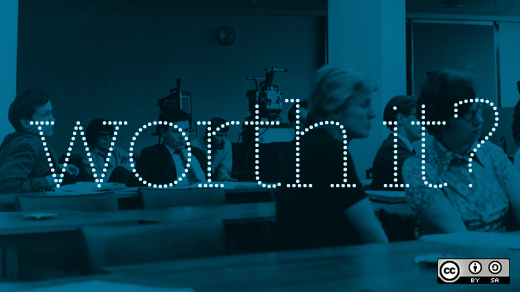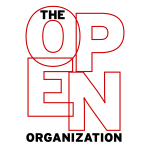Becoming (or remaining) an open organization is challenging. This month, the open organization community at Opensource.com discussed those challenges—and so much more—during our #OpenOrgChat on Twitter. If you missed it, check out the recap below as you prepare for our next chat.
Q1: What's the most recent challenge you've overcome in an OpenOrg?
A1: Encouraging team to share success stories. Seeing value encourages sharing. #OpenOrgChat https://t.co/Q81TqPKa2K
— David Egts (@davidegts) August 25, 2016
Our new strategic plan. Moving from understanding & alignment to greater trust, engagement & ownership https://t.co/AOAZir5mQe #OpenOrgChat
— Matt Thompson (@OpenMatt) August 25, 2016
@openorgbook A1 moved to a new role, needed resources from other groups, it was VERY easy. #OpenOrgChat
— Thomas Cameron (@thomasdcameron) August 25, 2016
@openorgbook A1: Organization inertia & status quo mindset is a big challenge to embracing open. Good news = it can be done #OpenOrgChat
— Garrett Putman (@gputman) August 25, 2016
A1: Convincing some senior civil servants that it's okay to run a government project like a business #OpenOrgChat
— Amy Gaskins (@AmyVGaskins) August 25, 2016
A1: Leaders who assume others are the problem and they don't need to change themselves - need to find ways to hold up a mirror #openorgchat
— jackieyeaney (@jackieyeaney) August 25, 2016
Q2: What are the largest barriers to effective #collaboration in OpenOrgs? Strategies to enhance collaboration?
A2: Rigid hierarchical culture. Don’t ask permission to make small fixes. #OpenOrgChat https://t.co/p6ZVFfZScM
— David Egts (@davidegts) August 25, 2016
A2. Firehosing. Too many documents / updates / tabs / channels = ack!!!! (solution: establish single point of truth) #OpenOrgChat
— Matt Thompson (@OpenMatt) August 25, 2016
A2: Don’t bring problems w/o a proposed solution. Otherwise you’re just complaining. #OpenOrgChat
— David Egts (@davidegts) August 25, 2016
A2: That's easy...in government it's politics (literally) #OpenOrgChat https://t.co/p7Ie2qjUxL
— Amy Gaskins (@AmyVGaskins) August 25, 2016
A2: The mistaken belief that you're the only person who needs to move fast. :-) #OpenOrgChat
— Rebecca Fernandez (@ruhbehka) August 25, 2016
A2: The largest barriers are working with new people who you haven't established trust with (yet) #OpenOrgChat https://t.co/OMAHT8N12W
— Jason Hibbets (@jhibbets) August 25, 2016
A2: Also, it's people who want credit, but don't want accountability for results #OpenOrgChat
— Amy Gaskins (@AmyVGaskins) August 25, 2016
A2: Timezones. Keep each other up to date with effective tracking tools or mailing lists. #openorgchat https://t.co/e3y6CyfLlW
— Woo Huiren (@woohuiren) August 25, 2016
A2: Sometimes when building projects, designing for version 3.0 before version 1.0 is even done. #OpenOrgChat
— JP Sherman (@jpsherman) August 25, 2016
A2: too much information, coming too fast to process. Favorite strategy #2: create great stories that can be easily processed. #OpenOrgChat
— Chris Grams (@cdgrams) August 25, 2016
Q3: What makes balancing "community" and "brand" in an OpenOrg most difficult?
A3: If community & corporate goals are at odds, fix one or the other. #OpenOrgChat https://t.co/iz1VxSgbGP
— David Egts (@davidegts) August 25, 2016
A3: there can be many strong (and right) definitions of brand & community that don't always overlap #OpenOrgChat https://t.co/xEFKaCGpTx
— JP Sherman (@jpsherman) August 25, 2016
A3: Community needs to be trusted to make great things happen. Brand (traditionally) needs to be safeguarded. Paradigm shift. #OpenOrgChat
— Rebecca Fernandez (@ruhbehka) August 25, 2016
Q3: Is this a trick question? Your community is your barnd #OpenOrgChat
— Jeff Mackanic (@mackanic) August 25, 2016
A3: balancing the brand the org promotes & the brand that the customers feel can come in conflict when either is rigid #OpenOrgChat
— JP Sherman (@jpsherman) August 25, 2016
A3. Software -- with innovation from the community -- is the new brand of the enterprise. #OpenOrgChat
— E.G.Nadhan (@NadhanEG) August 25, 2016
A3) Stakeholders often over-estimate abstract brand risks & "what-ifs" + underestimate the benefits of more open network power #OpenOrgChat
— Matt Thompson (@OpenMatt) August 25, 2016
A3: IMO, community and branding goes hand in hand. Your community is part of your brand. #openorgchat https://t.co/mnvxP7oPIe
— Woo Huiren (@woohuiren) August 25, 2016
@gputman A3: I'm inspired by the work of @mozilla in their #OpenDesign project https://t.co/S7SSh2Blk0 #OpenOrgChat
— Garrett Putman (@gputman) August 25, 2016
Q4: How to implement systems for evaluation/merit when working with external contributors and communities?
A4: Need reward system to encourage contribution. (Not necessarily monetary.) #OpenOrgChat https://t.co/ZSjPXbNW4N
— David Egts (@davidegts) August 25, 2016
A4: You have to ask your community what motivates them and implement systems based on that #OpenOrgChat https://t.co/pCEAc5gf5e
— Jason Hibbets (@jhibbets) August 25, 2016
a4. governence systems, standards, and review processes are at the heart of a lot of community efforts. create those w/ cmnty #openorgchat
— Sam Knuth (@samfw) August 25, 2016
A4: Clearly define "what good looks like" and how system works. Remember that negative feedback is best delivered privately. #OpenOrgChat
— Rebecca Fernandez (@ruhbehka) August 25, 2016
A4. It's simple -- Value achievement -- not advancement :: @JackieYeaney #GoodRead #OpenOrgChat - https://t.co/zm5aVAaTgq
— E.G.Nadhan (@NadhanEG) August 25, 2016
A4) Carrot before (measuring) stick. Start by evaluating *our own* value proposition to contributors & communities first #OpenOrgChat
— Matt Thompson (@OpenMatt) August 25, 2016
A4: work with the community to establish clear guidelines, post the guidelines publicly, then openly report results regularly #OpenOrgChat
— Jeff Mackanic (@mackanic) August 25, 2016
Q5: In OpenOrg, great ideas keep coming. How to stay agile and respond while getting stuff done?
A5: Decide on idea quickly (yes, no, defer) to set expectations. Then execute. #OpenOrgChat https://t.co/m0sgtScrAp
— David Egts (@davidegts) August 25, 2016
a5. read fast. sanity check often. block out time to work w/ out distraction #openorgchat
— Sam Knuth (@samfw) August 25, 2016
A5) This feels important yet impossible. Most people I talk to feel stretched thin on too many projects and initiatives. :| #OpenOrgChat
— Matt Thompson (@OpenMatt) August 25, 2016
A5 As a data person having a good idea of potential benefit + a cut-off metric to know when to drop it #OpenOrgChat https://t.co/w2qBRRjoVm
— JP Sherman (@jpsherman) August 25, 2016
@openorgbook @ruhbehka A5: I believe in using #agile principles to focus, prioritize, & make choices #OpenOrgChat https://t.co/x0B1MfmY0t
— Garrett Putman (@gputman) August 25, 2016
A5: Release early + often, improve as you go. Will always be more ideas than you can use. Watch out for diminishing returns. #OpenOrgChat
— Rebecca Fernandez (@ruhbehka) August 25, 2016
A5) The more I try to learn about open, the more I feel like *relentless focus* is its (essential but elusive) cousin #OpenOrgChat
— Matt Thompson (@OpenMatt) August 25, 2016
A5: We use a sprint-based process w/ a synthesis at end of each sprint. Allows ppl to catch up / reengage if they fall behind. #OpenOrgChat
— Chris Grams (@cdgrams) August 25, 2016
Q6: What's challenging about being open when working in support of a specific business strategy?
A.6. The challenge of sharing the right information at the right time while being open in support of strategy #OpenOrgChat
— E.G.Nadhan (@NadhanEG) August 25, 2016
A6: Helping people understand that not everyone can know sensitive things (HR, M&A). #OpenOrgChat https://t.co/Y4sVIupQW8
— David Egts (@davidegts) August 25, 2016
A6: being open can be an invitation to chaos - people who care about strategy reign in that chaos #OpenOrgChat https://t.co/PnUj0c0xdA
— JP Sherman (@jpsherman) August 25, 2016
A6: Balancing agility (reacting to emerging info + ideas) with focus and drive. You won't always know the right answer. #OpenOrgChat
— Rebecca Fernandez (@ruhbehka) August 25, 2016
A6: In gov, you're the open minority and the political Goliath is sabotaging you to maintain status quo #OpenOrgChat https://t.co/yrMjMIQVS0
— Amy Gaskins (@AmyVGaskins) August 25, 2016
Q7: How have you handled bringing in new people unfamiliar with an open organization?
A7: for new people it is critical to have a mentor who can translate the language, norms, and rituals of the community #OpenOrgChat
— Jeff Mackanic (@mackanic) August 25, 2016
A7: Lead by example: share what you’re doing, why, & results. Let them try it, & coach. #OpenOrgChat https://t.co/eKu1KMHDaU
— David Egts (@davidegts) August 25, 2016
A7: for new people it is critical to have a mentor who can translate the language, norms, and rituals of the community #OpenOrgChat
— Jeff Mackanic (@mackanic) August 25, 2016
A7: I spend a lot of time talking at New Hire Orientation. :) Encourage them to approach others with curiosity, not judgment. #OpenOrgChat
— Rebecca Fernandez (@ruhbehka) August 25, 2016
A7. @openorgbook New-hire orientation in open orgs must focus on #culture and #mindset in addition to core business #OpenOrgChat
— E.G.Nadhan (@NadhanEG) August 25, 2016
A7 and have departmental/divisional mentors who can help with continuing emphasis on Open. #OpenOrgChat
— Thomas Cameron (@thomasdcameron) August 25, 2016
@openorgbook A7: I've always liked the idea of on-boarding people w/ the expectation of being T-shaped #OpenOrgChat https://t.co/4zoFuPldRv
— Garrett Putman (@gputman) August 25, 2016
A7: Bring them into a project, let them observe first and ask lots of questions, then jump right in #OpenOrgChat https://t.co/Bj6YTzce2m
— Jason Hibbets (@jhibbets) August 25, 2016
Q8: What tools have helped alleviate a frustration or challenge your team faced?
A8: Well, I'm partial to the Open Decision Framework. https://t.co/T37edD67ul #OpenOrgChat
— Rebecca Fernandez (@ruhbehka) August 25, 2016
A8: Tools that offer transparency for work and workflows: Trello, @waffleio, Bugzilla, Wiki's #OpenOrgChat https://t.co/PyLNxJ3r65
— Jason Hibbets (@jhibbets) August 25, 2016
A8. Example of #technology alleviating challenges #OpenData #openOrgChat @MyOpenNotes - https://t.co/pA5vpOeWl4
— E.G.Nadhan (@NadhanEG) August 25, 2016
A8 We don't use it much here, but it's been amazing for me to watch how Slack turned IRC into something "normal" people love #OpenOrgChat
— Matt Thompson (@OpenMatt) August 25, 2016
Q9: What's the largest impediment to #transparency in an OpenOrg?
A9: silo's and competing priorities are impediments to transparency #OpenOrgChat
— Jeff Mackanic (@mackanic) August 25, 2016
A9: Fear of transparency coming back to haunt those who share. #OpenOrgChat https://t.co/7YW25cvXym
— David Egts (@davidegts) August 25, 2016
A9: Fear of the “gift” of (potentially negative) feedback. #OpenOrgChat
— David Egts (@davidegts) August 25, 2016
a9 Sometimes when you don't HAVE the data it may appear that you aren't being transparent #openorgchat
— jackieyeaney (@jackieyeaney) August 25, 2016
A9 regulatory requirements, fear of releasing strategy information, and plain old fear of being wrong. #OpenOrgChat
— Thomas Cameron (@thomasdcameron) August 25, 2016
A9: Being face-to-face is important, esp for distributed teams. Meals together make convo easier (less meeting, more eating)! #OpenOrgChat
— Amy Gaskins (@AmyVGaskins) August 25, 2016
A9) Lack of trust. Underlying issues and power dynamics that are bigger / longstanding elephants in the room. #OpenOrgChat
— Matt Thompson (@OpenMatt) August 25, 2016
A9: Fear of change. When you've worked for orgs that use "The Tarkin Principle" painful habits to break #OpenOrgChat pic.twitter.com/fd33BNbyOI
— JP Sherman (@jpsherman) August 25, 2016
A9: Fear of change (complete with complex/ever-changing policies, written & unwritten, and bureaucracy) #OpenOrgChat https://t.co/U9eKR17GZh
— Amy Gaskins (@AmyVGaskins) August 25, 2016






Comments are closed.